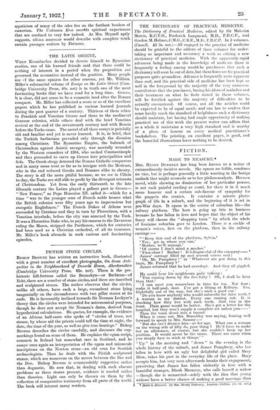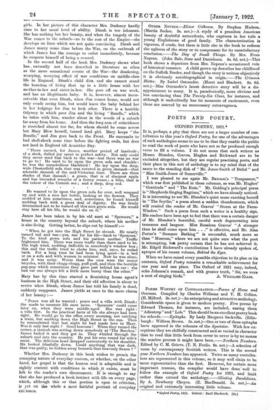FICTION.
MADE TO MEASURE.*
MRS. HENRY HIIDENEY has long been known as a writer of extraordinarily incisive novels. She spares no foible, condones no vice, but is perhaps generally a little wanting in the benign outlook that might reconcile us to her pitiless analysis. Her new novel, while showing no diminution of her particular powers, is not such painful reading as usual, for .there is in it much more humour and a certain sub-flavour of sympathy for the puppets she creates. It contains a minute photo- , graph of life in a suburb, and the beginning of it is set in pre-War days. It opens in the centre of suburban life—the . railway platform. The hero is going up late to business because he has fallen in love and hopes that the object of his fancy will choose the " shopping train " by which the whole of feminine suburbia goes to London. There is a cackle of women's voices, first on the platform, then in the railway carriage :- "' Keep this end of the platform, Sylvia.'
Yes ; get in where you can.' Mother, we'll manage.'
Of course I don't mind a smoker.'
First-class ? Rather ! It's disgraceful of the company— ' James' carriage filled up and several voices said :
' Oh, Mr. Pumphrey ! ' or Whatever are you doing in this
train, Mr. Pumphrey ? ' James returned that he had overslept. And they all giggled.
• He could hear his neighbours gaily talking : You coming down by the five-forty ? Oh, I shall be later ' than that.'
I can meet you. somewhere in time for tea. Not four ; make it half-past, dear. I've got a fitting at Kilburn. Yes, frightfully out of the way, but she's such a good cut.'
Do you know anybody who would subscribe for false teeth T A woman in my district. Every one coming out. It is shocking how they live with such teeth. Just two in the front. Plain gums would be better. She's got a letter for the hospital, but they won't supply a complete set unless you—' Then the train dived into a tunnel.
When it came out, Mrs. Brambley was saying, leaning well forward. to speak to Mrs. Samms
But she can't divorce him—at her age. What can a woman on the wrong side of fifty do, poor thing ? He'd have to make her an allowance, of course, but she couldn't keep up her position. It would never be the same. There are cases when you simply have to wink at things.' " " Up " in the morning and " down " in the evening is the whole history of the suburb, and James Pumphrey, who has fallen in love with an ugly but delightful girl called Mary Blow, takes his part in the everyday life of the place. Mary' accepts him, but very soon afterwards breaks their engagement, perceiving that James has fallen violently in love with a. beautiful stranger, Dinah Marmery, who calls herself a widow —though she is unmarried—solely with the idea that young widows have a better chance of making a good marriage than • Made to Measure. By Mrs. Henry Dudeney. London : Collins. fis. fni. netj
girls. In her picture of this character Mrs. Dudeney hardly rises to her usual level of ability. Dinah is too inhuman. She has nothing but her beauty, and when the tragedy of the War comes to the suburb—as to the rest of the Empire—she develops on lines which are not quite convincing. Dinah and James marry some time before the War, on the outbreak of which James has the courage to enlist immediately, because he suspects himself of being a coward.
In the second half of the book Mrs. Dudeney shows what has . naturally not been described in literature as often as the more sensational events of the War—the deadening," wearying, worrying effect of war conditions on middle-class life in England. Dinah's child dies, and she cannot stand the boredom of living shut up in a little house with her mother-in-law and sister-in-law. She goes off on war work, and has an illegitimate baby. It is, however, almost incon- ceivable that even Dinah, when Jim comes home, would not only evade seeing him, but would leave the baby behind her in her lodgings for Jim to look after. There is a horrible Odyssey in which poor Jim and the living " Bundle," which he takes with him, wander about in the woods of a suburb far away from his home. And then the long arm of coincidence is stretched almost too far, for whom should he come across but Mary Blow herself, turned land girl. Mary keeps " the Bundle," and Jim goes back to the Front. He succumbs to bad shell-shock some time before the fighting ends, but does not land in England till Armistice Day.
" There ensued, for James, another period of lassitude ; of a sleek, dulled joy spent in perfect safety. Not only could they never send him back to the war—but there was no war to go to He used to lie upon the green sofa and chuckle : he was the unmelodious blackbird ! He lay upon the deep, wide Chesterfield sofa that was covered in green damask—that adorable damask of the mid-Victorian time. There are three shades of that damask • a green, that is of sharpest apple and has brocaded wreaths of a fawny cream ; a blue, that is the colour of the Cornish sea ; and a deep, deep rod.
. . . • •
He wanted to lie upon the green sofa for ever, well wrapped up and with a nice hot bottle, looking at the flowers. They nodded at him sometimes, and, sometimes, he found himself nodding back with a great deal of dignity. He was firmly determined not to be turned off this nice green sofa. He would stay here all his -life, he would- die on it.
Jaines has been taken in by his old aunt at " Spencers," a house in the country beyond the suburb, where his mother is also living. Getting better, he slips out by himself " When he got into the High Street -he shrank. He nearly turned tail and ran—yes, ran for his life—back to Spencers. To the kind green sofa and his patient mother. Traffic frightened him. There was more traffic than there used to be. The high wind, nodding daffodils in somebody's window box ; this and the traffic tried to choke him, and, once, ho reeled back. For a long time he had been lying quiet—in a bed or on a sofa and with women to minister. Now he was alone, and it was noisy. Worse than the cars were the motor bicycles, with their chugg-chugg, puff-puff, and then the horrible pop-pop which sometimes they gave- just behind his ear : the bad ear one always felt a little more buzzy than the other."
Mary has by this time started a flourishing house agent's business in the High Street, and their old affection-is about to revive when Dinah; whom James has told his family is dead, suddenly reappears. James yields at once to the mere charm of her beauty :- " Peace was all he wanted : peace and a villa with Dinah • the made to measure life once more. Spencers' could come later on, when they were middle-aged. She was right : a villa first. In the practical facts of life sho always had been right. He would go to the office every morning, not catching a train, but ambling down the High Street in the sun. Then he remembered that last night he had made love to Mary. Was it only last night ? Good heavens ! When they turned the corner, a taxicab was setting down somebody at ' The Beeches.' James hailed it and they got in. They whirled through the suburb and into the country. He put his arm round his wife's waist. The delicious head dropped contentedly to his shoulder. He looked blissfully down. Could anything that was dark, that was guilty, be hidden away beneath that heavenly flaxen ? "
Whether Mrs. Dudeney in this book wishes to preach the cramping nature of everyday custom, or whether, on the other hand, her gospel is that the human soul is adaptable and is rightly content with conditions in which it exists, must be left to the reader's own discernment. It is enough to say that she has produced a book instinct with life on every page, which, although this or that portion is open to criticism, is yet on the whole a most faithful portrait of everyday existence.











































 Previous page
Previous page